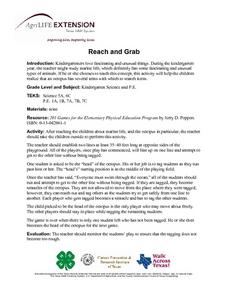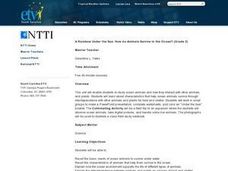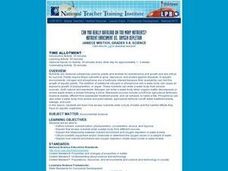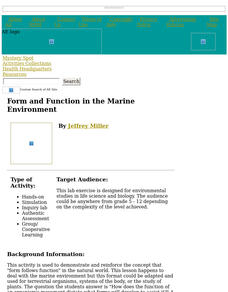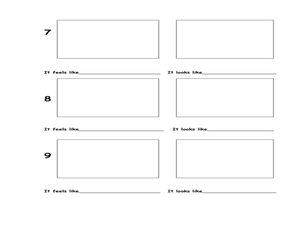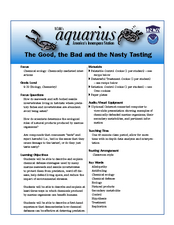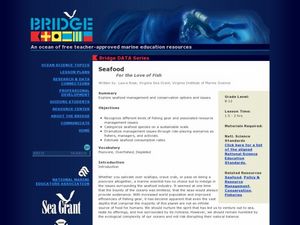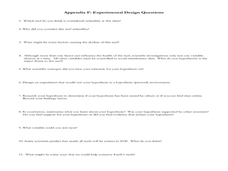Curated OER
Seaside Science
Students classify sea life and shells and develop computer-generated tables and graphs. They observe a desalinization demonstration and enter information on their laptops through each step of the scientific experimental process.
Curated OER
Reach and Grab
Students examine the different types of marine life and participate in an activity to show the many arms of an octopus.
Curated OER
Ocean Life
Learners examine the fossil remains of ancient sea creatures. They create casts of fossils and identify how sea fossils are formed and consider what type of information fossils can give to scientists.
Curated OER
A Rainbow Under the Sea: How do Animals Survive in the Ocean?
Second graders read books, watch videos, complete worksheets and participate in class discussions about ocean animals. They, in groups, design PowerPoint presentations on selected marine animals.
Curated OER
Nutrient Enrichment vs. Oxygen Depletion
Pupils investigate how excess nutrients enter a body of water, and the harmful effects they have on aquatic organisms.
Curated OER
Sea Connections
Students, after locating different marine habitats on a globe, play a card game about ecosystems, food webs and organisms.
Curated OER
All About Me-I'm My Own Research Project
Third graders see how to do a research project. They understnad how to categorize information about themselves and relate it to information on sea animals for a future research project. This instructional activity fits in nicely with any...
Curated OER
Ocean Life
Students explore the types of plants and animals that can be found in the ocean. They browse books and/or magazines to identify and gain a knowledge base of plant and animal life found in the ocean, then create a collage.
Curated OER
Octopus Legs
Students have oceans of fun transforming a wienie into an octopus they can eat! After counting, cutting halves and fourths, observing steam and the effects of heat, they mix colors as they create a yummy dipping sauce from mustard and...
Curated OER
Predator/Prey Activity: Fish Feeding, Environments, and General Behavior
Students explore concepts of environment and survival among different marine life, focusing on the ocean environment.
Curated OER
ARTQUARIUM
Students identify different underwater creatures, explain the importance of recycling in the community, plan preliminary sketches on paper, and construct and sculpt with chosen materials to create creature in paper mache.
Curated OER
Form and Function in the Marine Environment
Young scholars study the relationship of form and function in the marine environment.
Curated OER
What Ocean Animals Do Worksheet
In this ocean animals worksheet, learners draw lines to match pictures of ocean animals to their descriptions, 6 total. A website reference for additional resources is given.
Curated OER
Water Striders
Young scholars analyze water strider behavior. In this water strider activity, students study the movement and feeding behavior of water striders. Young scholars catch water striders and then generate scientific observations.
Curated OER
Exploring Marine Objects
Students identify the sources of water on Earth. In this life science lesson, students list the different plants and animals that live in the ocean. They explore marine objects in the lab and draw them.
Curated OER
Pipeline to the Coral Reefs
Students discuss the relationship of density to stratification. In this marine science instructional activity, students create a model of upwelling events using cold and warm water. They discuss how water phenomena affect coral reefs.
Curated OER
Harmful Algal Blooms in Full Bloom
High schoolers calculate the total percentage of samples from the data on the graphs. In this marine science lesson, students analyze the concentration levels over a period of time. They suggest ways to lessen the effect of these blooms.
Curated OER
The Good, the Bad and the Nasty Tasting
Students examine the effect of chemicals from marine plants or animals on predator's preferences. In this ecology lesson, students conduct taste tests and collect necessary data. They write their conclusion after analyzing experimental...
Curated OER
The Dead Zone: A Marine Horror Story
Students graph dissolved oxygen versus depth using data taken from NECOP Program. For this marine science lesson, students explain the causes of hypoxia. They recommend possible solutions to this problem.
Curated OER
Light Up the Deep Sea
Students simulate bioluminescence in the marine environment. In this marine science lesson, students investigate how animals in the deep ocean communicate with each other. They explain the function of bioluminescence among marine organisms.
Curated OER
Amphipods
Students identify organisms that live at the bottom of the body of water. In this biology lesson, students evaluate the effects of pollution to amphipods population. They examine collected data and create a bar graph comparing them.
Curated OER
Seafood: For the Love of Fish
Students role play a scenario specific to decision making in seafood management and conservation. In this marine science lesson, students estimate seafood consumption in their state. They recommend new regulations for better fishery...
Curated OER
Marine Biology Lesson on Understanding the Dynamics of the Reef Ecosystem
Students compare data from a healty and unhealthy reef ecosystem. In this marine biology lesson, students identify which sample is stressed. They formulate a hypothesis on why the reef is stressed and support their hypothesis with proven...
Curated OER
Bermuda: Search for Deep Water Caves 2009: Out of Darkness
Students analyze the three models on the origin of troglobitic fauna. For this life science lesson, students also consider how the Zonation model explains the fauna's origin. They also use the Internet to research solutional and volcanic...



